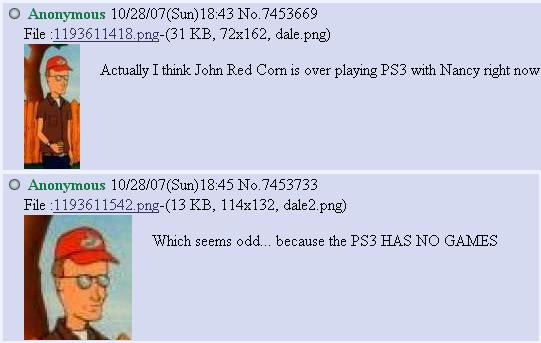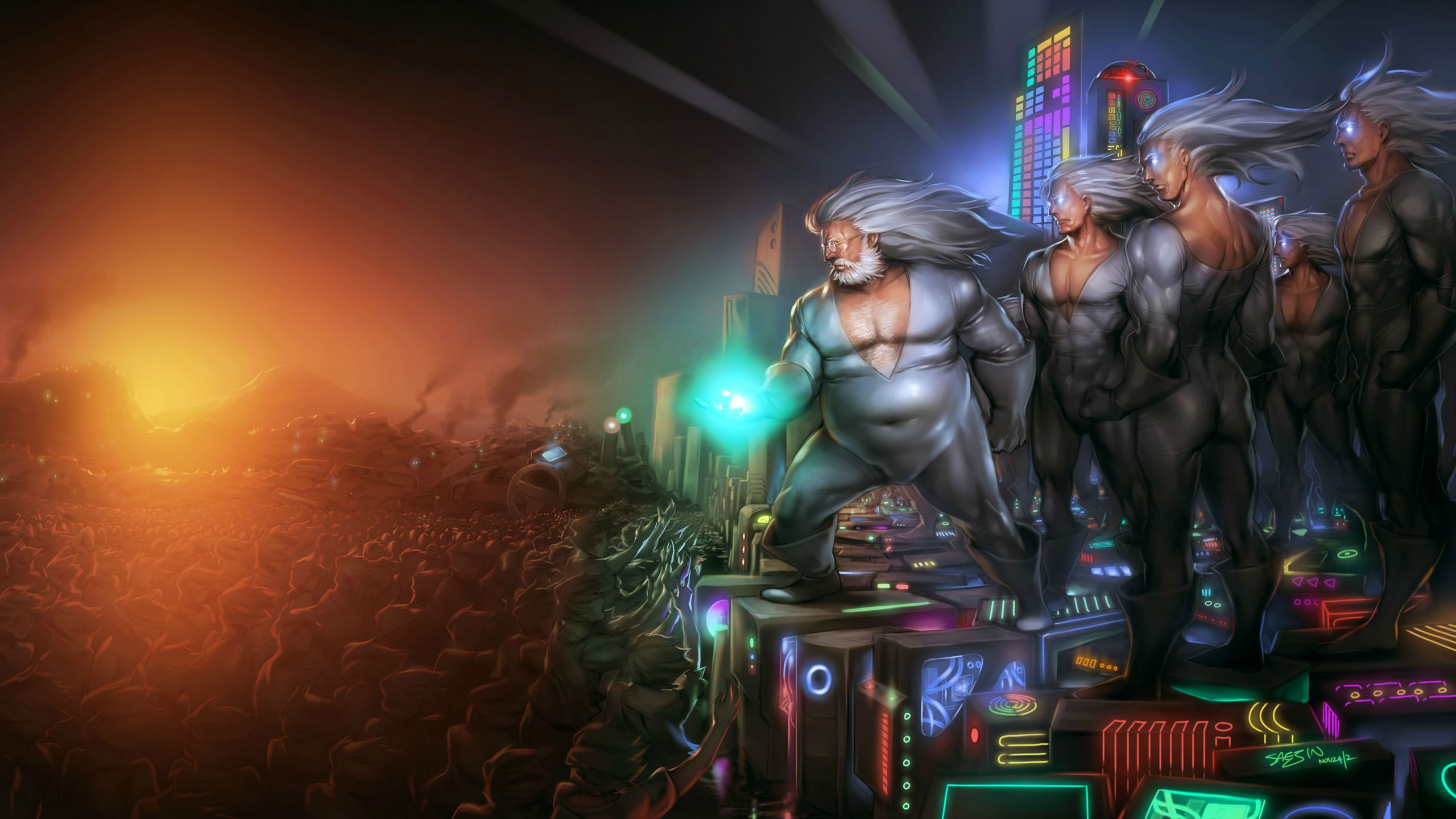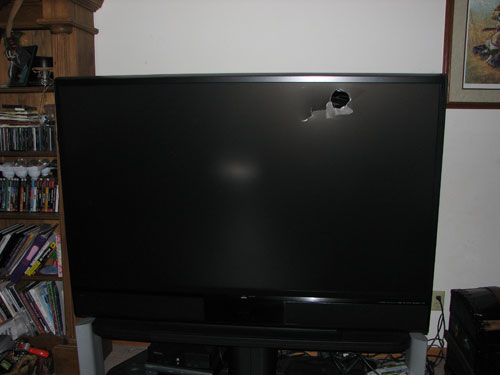I've been playing games for 80% of my life now and that number will only inch upwards as I continue into old age, senility, and all the other horrible things that go along with it. I've been the kind of enthusiast that always wanted the newest games and the latest information, making E3 an inter-dimensional portal to the future and, oh my God, the future is awesome! Seriously, have you guys seen the Nintendo 64? 64 is a ridiculously high number which means it's super-powerful.
The point is, I've been around the block. I've been a dedicated portable gamer. I've been on the winning side of console wars and I've been on the losing side of the console wars. I've seen fat times and I've seen lean times, and so has the industry. But consoles have never seen so many threats to their market, including the missteps that have taken place over the past eight years. Believe me when I say the major console manufacturers have kind of screwed themselves on this one.
[Credit]
"The Motion Control Problem"
Let's take Nintendo for example, as, in a way, they're the ones responsible for disrupting gaming technology with what-the-f***-magic motion controls. Swinging a Wiimote around like an idiot certainly felt like tennis, and Jesus Crust did it catch on. You couldn't violently swing a controller without hitting a non-gaming human being who wanted to play Wii Bowling or Just Dance or Wii Fit or any number of absurd party games with you because they didn't know how to turn on the Wii, normally their teenage son does it.
The "revolution" reignited Nintendo's family-friendly brand, but the Xbox 360 and PlayStation 3 manufacturers felt left out—perhaps Sony more than Microsoft. The guys over at Sony decided at the last minute to half-ass motion controls in the standard PlayStation controller, combining it with an absurd price tag to create a PS3 false-start that made the rest of the current-gen an uphill battle. Naturally, when Sony took time to address "the desire for motion controlled gaming" they saw that copying Nintendo was yet again the best way to go, despite the notable improvements made to game-wand technology in Move.
The PS Eye and its enhanced motion-tracking put the accuracy offered by the Wiimote to shame, but it's not like Move sold more PS3s. I'm sure there were some consumers who saw the bundle and felt like a PS3 was a safe buy now that it had mom-and-grandpa-friendly motion controls, but even Sony's first-party games couldn't make Move a bigger deal than it was ever going to be. If I had to give Sony a rating on how jacked up the Move move was, it'd be a color. And it would be red, as in "Don't go there again, Sony." Stay the course, be "for the gamer."
It should be clear, though, that Microsoft took motion controls in a horrifying new direction. With Apple on the rise, the software giant lost sight of the Xbox brand to focus on Microsoft Surface and Windows 8, criminally under-supporting the 360 in its final years of relevance. The Wii and Move were distractions to be sure, but Kinect was nothing more than a fad. The motion-sensing camera seemed different enough from the Wii for consumers to bite, and it quickly sold out everywhere. Never mind that Kinect is garbage for playing games, makes you feel stupid, and then tells everyone on your Facebook about it.
Kinect just wasn't practical, laced with an anti-mass-consumer motif that seems to have bled into the next-generation Xbox's supposed always-online plans. You needed a humongous living room and possibly even had to move furniture to play. The number of Xbox 360s in dorms and apartments is astounding, so the majority of Xbox development budget that went into creating Kinect games never benefitted the core Xbox gamer, the dude-bro shooter fans we've all come to know and love (by their mouth-breathing online).
I own every piece of motion-tech from this console generation, and aside from the first month of ownership, I haven't used any of them since. I've never said, "Hey, I really wanna play Killzone 3 with a magic wand." I've never said, "Yes, I would like to yell at my TV during Mass Effect 3 multiplayer." I've never said, "Remember Wii? I miss playing games on that because I sold it." Anytime your girlfriend expresses interest in playing video games, you encourage it, but trust me when I say that Kinect won't hold her attention. Still, Nintendo was the one that hurt the most.

[Credit]
"No gaems."
Knowing full well that Wii wasn't for Nintendo fans like me was painful. Nintendo fans that supported GameCube and loved the purple lunchbox with all their hearts didn't get the revolution they expected. Once I had played Super Mario Galaxy, I felt comfortable giving the Wii up in favor of an HD console and its "core" games.
The abuse of party games didn't start and stop with motion controls, but the past several years have been a renaissance of crap. Key genres dominated and saturated the market, making shooters an ubiquitous hallmark of the "gamer" persona. If the next 18-to-36-year-old male I meet asks you if you wanna play Call of Duty, kick them in the nuts. There have got to be better ideas than Refined Shooter 23 and Annual Sports Simulation '98.
The year-by-year fatigue only worsened in this late stage, where tentpole franchises come in as underwhelming and uninspired. Any God of War fan will tell you that the third game in the series is better than Ascension, as should any COG worth his or her salt with Judgment. The big publishers have turned to the cutting room floor for anything they can publish, and it shows. These after-thought prequels felt desperate and phoned-in, leaving gamers like me to ask where all the innovation was in this too-long console generation.

[Credit]
"I'm indie, ever heard of it?"
The mom's-garage game developers out there are hungry and there's motion-gaming blood in the water. Knowing full well that the big publishers weren't supporting the current console generation, more and more independents have turned directly to the consumer for funding, taking bites out of critical revenue streams for each console. Xbox Live Arcade and PlayStation Network downloadables helped to fend the tide off for a while, but growth in the PC market means the most readily available dev kit in the world is sitting in your office. Anyone can make a game today, and many do.
That's why PlayStation is reaching out to indies, offering reduced publishing costs and free development kits. Microsoft's unfriendly attitude and prohibitive developer-fee structure painted a target on the Xbox 360, making the dream of releasing your very own game on a console that much harder to realize. Let's not get lost in the mysterious, foggy waters surrounding WiiWare channels.
The takeaway is that David can and regularly does beat Goliath. The insane popularity of League of Legends (and Minecraft before it released on Xbox 360) should tell the hardware manufacturers this quite explicitly. Nintendo, Sony, and Microsoft have to accept that a more open, less-restrictive platform is the way to go, and the lack of an inventive, off-the-cuff software presence on the PS3 and Xbox 360 has only worsened the tail-end of this console generation. Xbox Live Arcade updates are slowing to a trickle, but Sony's PlayStation Plus plan has been a shot in the arm for that community. The indies are coming around in time for PS4, but the war with iPhone may have already been lost.

"iOS, therefore I am."
As if indie development sounded easy, the possibility of striking it rich on the App market single-handedly has taken away from console development. Key artists, gameplay designers, and other industry movers and shakers (especially in Japan) have abandoned the platforms they grew up on because of the way the console business crushed their spirits, turned them into FPS factories, or generally fallen short of inspiring them.
Now the freshest, most forward-thinking talent in games development has an open and accessible market waiting for their product. It doesn't matter if many iOS and Android games never hit the highs of an Angry Birds or Rope-Cutting Simulator. The fact that these individuals, the ones responsible for coding and designing the next big thing on your home console, have left the market altogether is a warning shot to Nintendo, Sony, and Microsoft.
None of which mentions the fact that a new generation of gamers are being robbed of the Big Three. Why would Bobby or Sally want a 3DS when they can play 50 different games in 50 seconds on their iPod Touch? If you're a teenager in high school, where your entire social life rests on whether or not you heard about what Ashley said at lunch, the choice between an iPhone and a console is clear.

[Credit]
"Let's keep it PC"
How many hardcore gamers, with budgets dedicated to new games and online fees, have abandoned the constrictive, limiting console experience for a shiny new "Next-Gen Now!" PC? The master race has been growing steadily for years, counting new members every day Steam has something on sale. (Did you know Steam always has something on sale?)
Every console has one weakness that could be their undoing, should the PC market attack. Microsoft charges money to play online, the PS3 has a prohibitively slow operating system, and Nintendo still caters to younger gamers as their fan base ages every day. With huge PC proponents like Valve and CD Projekt pushing the platform further and further into the gaming public's eye, it's no wonder even the family computer poses a threat to the box under your TV.
The threats to console gaming gain steam every day (seewhatididthere.jpg). Remember when Joey and Chandler convinced Rachel that she had to quit her job at Central Perk to get "the fear"? That fear would motivate her to find a better job faster. That's what Nintendo, Microsoft, and Sony need right now. They need the fear so they don't repeat these mistakes. They need the fear so they don't trip over themselves with new ones. They need the fear to ignite another generation-defining console war.
Consumers don't realize this, but the point of a console war isn't to "beat" the other company in the race. Both the Sega Genesis and Super Nintendo Entertainment System led happy, software-filled lives until the last cartridge swap. Sure, Nintendo may have out performed the other; sure, Microsoft may have sold more consoles worldwide; sure, a dual-screened handheld is yet again beating the Sony branded portable; but all of it can change in a split-second.
Momentum can shift, key titles can make impressive showings aligned with one console or the other, word of mouth can spread and even Minecraft can become an Xbox 360-exclusive. Anything can happen in the gaming industry, but when it does, it'll be at E3. Despite the worries I've outlined here, I'm confident each of the big three console manufacturers will continue to compete. I just want them to mean it this time.







